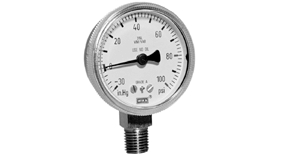

Pressure gauges measure the pressure in either a compressed gas or liquid and are imperative to many applications and processes. They are utilised across a wide range of industrial and general industries. For example, pressure gauges can be used to check tyre pressure but are also highly effective in more specialised fields, such as monitoring gas cylinders in a plant. With such a vast array of pressure gauges available, not to mention the huge amount of applications that require their services, you might be left wondering how to choose the right pressure gauge. In this article, we will be discussing different types of pressure gauges and the function of pressure a gauge.
The function of pressure gauge differs depending on the type of gauge being used. The reading will also vary depending on the specific instrument you are using. It is important to understand that some gauges measure pressure against a vacuum, while others measure the pressure relative to the air pressure, resulting in a different reading per gauge.
A pressure gauge works by using mechanical movements. An element inside the gauge moves in response to pressure changes, this then pushes the hand on the gauge to provide a metered reading.
Pressure gauges are mainly used as a safety feature to prevent injury to people. By measuring the pressure users are able to predict and prevent potential explosion or stress on equipment. In an industrial setting, pressure gauges monitor pressure in process lines to enable safe and efficient processes and, in turn, plants.
Pressure gauges are utilised in a range of industries but are most commonly found in the automotive sector. In this field, pressure gauges are often connected to a remote indicator panel, which will alert a driver when the pressure gauge has found an obscure measurement. They are also essential for checking tyre pressure.
At Fluid Controls, we supply many different types of pressure gauges from sensor technology experts WIKA. As official WIKA distributors, Fluid Controls can provide the complete range of WIKA pressure gauges, such as the Hydra-Gauge ultra-high purity pressure gauge.
WIKA’s Hydra-Gauge ultra-high purity pressure gauge has been developed with precision and reliability in mind. The patented HYDRA double diaphragm system allows for a safe and reliable separation of the pressure sensor from the process medium.
Some of the Hydra-Gauge’s main features include:
Based on the information above you should now have a better idea of how to choose the right pressure gauge. For more information about the types of pressure gauges we offer get in touch today on +44(0)118 970 2060 or via email at fluid@fluidcontrols.co.uk.